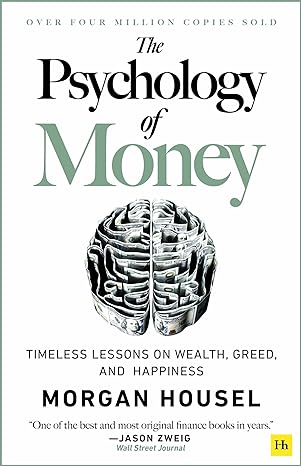The Psychology of Money: Timeless Lessons on Wealth, Greed, and Happiness
Morgan Housel’s The Psychology of Money (2020) isn’t your typical personal finance book. It doesn’t relate to the latest investment strategies or share the best stock tips for millennials. Since it’s not focused on investing per se, it ends up being quite inclusive – a truly general-interest offering, available to just about all of us.
In his book, however, Housel makes complex financial concepts accessible through stories and anecdotes, and he explicitly states that success in finance is far more dependent on your behavior than your intelligence. The book is full of fascinating chapters that look at the psychological traps we can fall victim to in how we earn, save, and think about our finances.
If you would like to get a free audiobook, continue here…
One of the key ideas that Housel stresses is ‘framing – how information is presented.’ Framing losses as misses can make you more willing to take calculated risks. An awareness of framing biases can help you make better financial decisions.
Another is the role luck and risk play in success: “The typical story of a successful life – financial or otherwise – is one with significant doses of luck,” Housel writes. ‘Focus on what you can control (behavior), not what you can’t (the market).
If you would like to get a free audiobook, continue here…
The book takes a slightly different angle and contains some of the best explanations of concepts such as time and compound interest. Get rich slowly by consistently putting money aside and allowing it to accrue over time, rather than trying to get rich quickly. Examples are given in easy-to-grasp ways, with the end goal in mind. Compound interest is a straightforward principle that saves you from having to lose your mind with the other financial jargon.
Housel doesn’t flinch from the emotional consequences of money, nor the tempting siren’s call of gluttony and sloth that causes otherwise-practical men to make terrible decisions from a place of greed and envy.
The book also champions contentment. Housel contends that: ‘True wealth … isn’t measured by what you’ve accumulated but rather’ by the ‘serenity and freedom’ that come from ‘living on less than you earn’.
The Psychology of Money is not without its limitations. Some might view the lack of concrete investment advice as a weakness. The book leans more heavily on ‘behavioral finance’ than on how to make money. In general, it favors setting a framework for wealth-building over explicit investment blueprints or tactics.
But if nothing else, the book is worth reading for its practical insights and the way it shifts our thinking about money. Next time you are faced with a dilemma about how to spend your money, you’ll have a shot at figuring out which choice is most likely to make you happy in the long run, if not right away.
If you would like to get a free audiobook, continue here…
Impressively, there isn’t a single bad word to be found. To be sure, The Psychology of Money increases the average person’s odds of ending up with something extra in his or her stock portfolio. Anyone wanting to become happier about money owes Housel a debt of gratitude and should read his book. Even those of us who presently have the money thing well in hand should buy it, read it, and then buy a copy for a young relative, some client whose investments we steward, or for a pro bono client who probably couldn’t afford it anyway. With Housel’s help, we’ll all have a bulletproof against the arrogance that accompanies the ease of wealth.
What’s more, we’ll all be richer for it. Adapted from ‘The Money Book’ by Robert Green (HarperCollins, $19.99), out this month.





